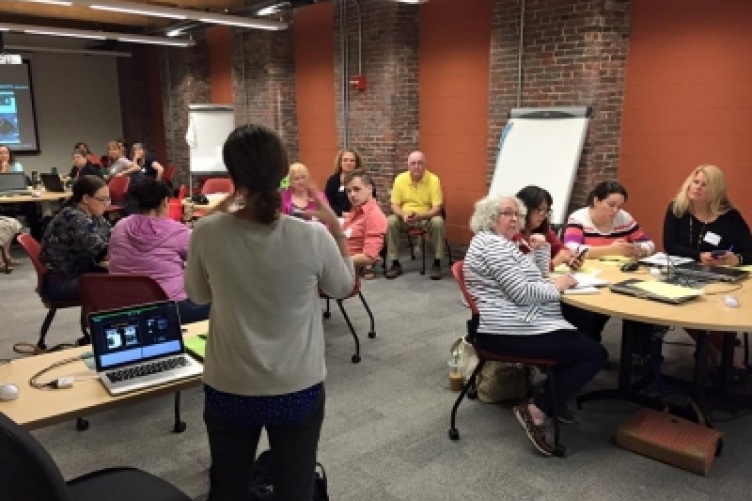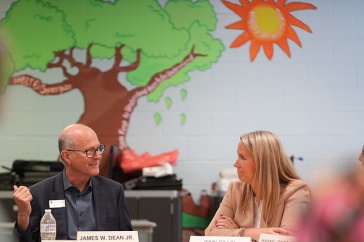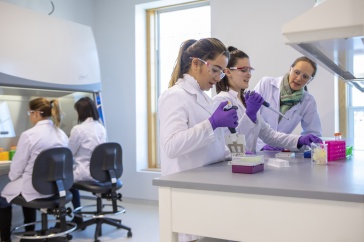
Technology has changed the way we interact with each other and engage with the world around us. And with new developments constantly, it’s also shifting the way we learn.
“Education needs to meet kids where they are at,” said Bob Baines, community relations director at Dyn and director of STEAM Ahead New Hampshire. “The landscape is changing, so we need to create learning environments that are conducive to today’s technology rich, connected culture.”
This week, local educators, administrators and business partners alike seized the opportunity to be part of this learning evolution through TeachCode Academy, a professional development program designed give teachers coding experience to integrate into their classrooms.
Held at UNH Manchester on June 14 and 15, this two-day workshop was a pilot program in the statewide initiative to implement computer science education across the curriculum. The program was developed through a collaborative partnership between Dyn, MIT’s Scheller Teacher Education Program, the Governor’s Task Force on Science, Technology, Engineering and Math (STEM) Education, STEAM Ahead NH and the Manchester School District.
Ross Gittell, chancellor of the Community College System of New Hampshire, chairs the Governor’s STEM K-12 Task Force. He said this initiative was created in response to three key findings that the task force identified: the need to expand STEM basics, inspire students to engage in STEM-related activities and empower educators to learn and teach coding principles.
“We have to strengthen the STEM foundations, including coding, because coding is the language of the 21st century,” Gittell said. “Integrating coding throughout the K to 12 curriculum is critical to inspiring our students.”
Gittell shared these findings with the Scheller Teacher Education Program at MIT, a group dedicated to preparing teachers to incorporate applied learning methods. Along with STEAM Ahead NH and Dyn, the groups identified areas for collaboration — and TeachCode Academy was born.
Carole Urbano, project manager and outreach specialist at Scheller Teacher Education Program, said creating engaging learning experiences is at the core of what they do. Programs like TeachCode Academy gives educators the tools and confidence to build hands-on learning into their curriculums.
“Aha moments generally happen not from being told something, but from observing or experiencing something in a way that allows you to make a connection,” Urbano said. “Those are the kinds of learnings that are more sustainable, and what we hope to empower teachers to encourage.”
Chris Motika, principal of Manchester West High School, said the heart of the initiative is that it’s designed for all academic disciplines. From Manchester West alone, there were special education, physical education, math, English, social studies, music, science and technology teachers represented at TeachCode Academy. Motika said he’s excited to see how the teachers incorporate what they’re learning into their curriculums, and what the students create in response.
“Maybe a student will build a nutrition app for family and consumer science class, or a fitness counter for their physical education class, or write a program or game that helps understand grammar concepts in English class,” Motika said. “We want to see how students translate and write code and create authentic learning products that demonstrates their learning in a content area.”
Educators learned four coding tools to bring to their classrooms: App Inventor, Gameblox, StarLogo and TaleBlazer. Each workshop was facilitated by Scheller staff, with MIT students on-hand as technical experts to assist teachers in the learning process.
Mihaela Sabin, associate professor of computer science and director of UNH STEM Discovery Lab, said teachers are perpetual learners when it comes to STEM — so building a network of growth and learning among teachers is central to this program’s mission.
“There is this fear of new technologies because they change so quickly and you need time to become familiar with them,” Sabin said. “Teachers and students need to be open to explore, tinker and share what works we can adopt best practices and create a community.”
Funding from Dyn, the New Hampshire Charitable Foundation and Granite United Way made the TeachCode Academy possible. Baines said this is just the start of a proactive statewide initiative to enhance project-based, hands-on learning.
“This is the beginning of bringing about a change in education which we fundamentally all agree needs to occur,” Baines said. “The economic vitality of this region and our state starts with education, what we're doing in our schools to prepare students with the skills to advance into employees of each sector of our community.”
-
Written By:
Kassidy Taylor | Marketing & Communications, UNH Manchester | kassidy.taylor@unh.edu



















































